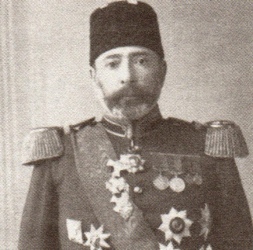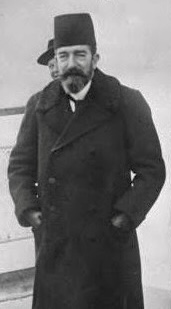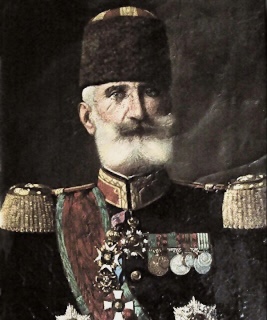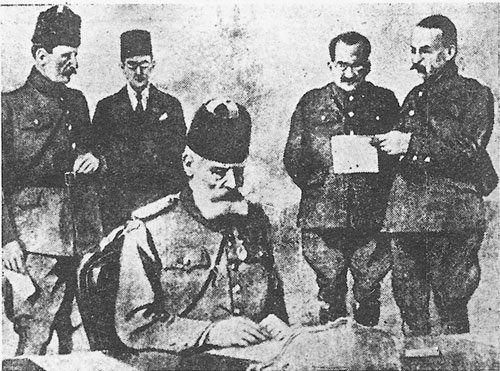<Back to Index>
- Supervisor of the European Armies of the Ottoman Empire and Grand Vizier Ali Riza Pasha, 1860
- Lieutenant General of the Ottoman Army Hasan Tahsin Pasha, 1845
PAGE SPONSOR


Ali Riza Pasha (Turkish: Ali Rıza Paşa , 1860 - 1932) was one the last grand viziers of the Ottoman Empire, under the reign of the last Ottoman sultan Mehmed VI Vahdeddin, between 14 October 1919 and 2 March 1920.
He was born in 1860 in Istanbul, son of a major. He
graduated from the Ottoman Military College in 1886. He
held military and administrative posts such as the
Governorship of Manastır
in 1903, after which he was exiled to Libya upon the
pressure exercised by Russia, since the Russian consul of the city
had been assassinated during his tenure. In 1905, he was
appointed to Yemen where he suppressed an uprising.
With the beginning of the Second Constitutional Era in the Ottoman Empire in 1908, he became the Minister of War in grand vizier Kıbrıslı Mehmed Kamil Pasha's government but had to be distanced due to objections raised by the Committee of Union and Progress. He was re-appointed to the same ministry in Hüseyin Hilmi Pasha's cabinet in 1909 but submitted his resignation because of the 31 March Incident. Appointed as supervisor for the European armies of the Ottoman Empire, the Balkan Wars erupted before he even had the time to assume his duties. Never favored by the Committee of Union and Progress, his career succumbed to silence during the single party regime of the Ottoman Empire during World War I. He was appointed as grand vizier on 2 October 1919, a post he held for five months.
In terms of effective shaping of policies by the remaining Ottoman state structure, his ministry (as well as his successor Hulusi Salih Pasha's) is usually considered as mere care-taking between the two tenures of Damat Ferid Pasha, the signatory of the Treaty of Sèvres.


Hasan Tahsin Pasha (1845 - 1918) was a senior Ottoman military officer, who served in Yemen and in the First Balkan War.
Hasan Tahsin was born in Messaria (modern Molista). During his youth, he attended and graduated from the Greek Zosimaia School at Ioannina, and spoke Greek fluently. He began service as a gendarme ca. 1870 in Katerini, and later joined the Ottoman Army as an NCO. He soon received a commission as an officer, and by 1881 he commanded the Ottoman Gendarmerie at Ioannina. During the Greco - Turkish War of 1897, he commanded the 6th Trabzon Division, and around 1900, he was placed as garrison commander of Thessaloniki. In 1908 - 1910, he served as the governor of Yemen before returning to Thessaloniki, where he assumed the post of CO of the III Corps with the rank of Ferik (Lieutenant General). After his retirement in 1912, he was persuaded to return to duty as governor of the vilayet and fortress of Ioannina.
As tensions with the Balkan League grew however over the summer of 1912, he was switched to command the VIII Provisional Corps at Thessaloniki. After the outbreak of the First Balkan War, he led his forces against the Greek Army of Thessaly under Crown Prince Constantine. The Greek army, better prepared and outnumbering his own forces, defeated VIII Corps in the battles of Sarantaporo and Yenidje. Surrounded and blockaded in Thessaloniki and with no hope of outside succor, and learning of the approach of the 7th Bulgarian Division from the northeast, Hasan Tahsin resolved to surrender the Thessaloniki fortress and his 26,000 men to the Greeks. After a few days of negotiations, a surrender protocol was signed on 8 November [O.S. 26 October] 1912, with the handover carried out the next day.
After his release from Greek captivity, he went into exile, first in France and later in Switzerland. He died in Lausanne in 1918 and was buried there. In 1937, his remains were transferred to the Albanian cemetery of Thessaloniki, and in 2006 to the Military Cemetery of the Balkan Wars at Gefyra. One of his sons, Kenan Messare (1889 - 1965), became a Greek citizen and a notable painter, known especially for his scenes from the Balkan Wars.